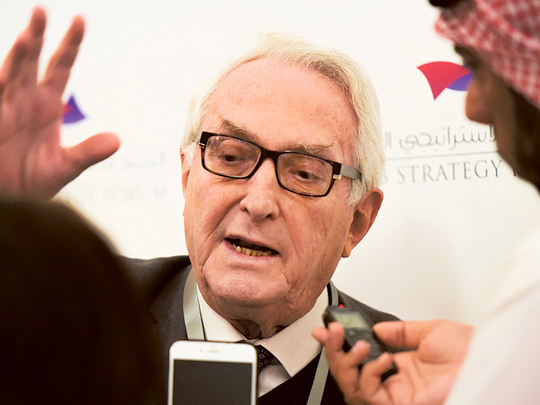
DUBAI: Former Lebanese Minister of Finance Dr Georges Corm says he considers developing economic diversity as the “most crucial” priority for the Arab world.
Without diversity, Dr Corm warned, “We will continue to have brain drain, we will continue to have unemployment — and the domestic unemployment, especially with young people, creates the atmosphere whereby you have young people going to religious extremism or to get their minds kidnapped by the terrorist organisations.”
He was speaking on the fringes of the Arab Strategy Forum, at the Ritz-Carlton Hotel, Dubai, on Wednesday, where he took part in a panel discussion looking at the economic outlook for the Arab world in 2017.
He said successful diversification would not be a quick process, and required a change in mindset from the private sector as well as the public sector.
“There have to have a dialogue between the private sector and the public sector to focus on this issue. The dialogue has been focused on what new privilege the private sector can get from the public sector. We have to get out of this logic.”
But as well as diversified revenue sources, Arab economies need better tax policies to protect them from oil-price volatility, he said during the panel discussion, pointing out that the GCC economies had no income tax at all, and some other Arab countries faced issues of corruption and tax evasion.
“It’s like driving a car with no fuel,” he said. “If we want to encourage the IT sector and the rest of the commercial sectors, the income tax ratio must be different.”
Both Dr Corm and his co-panellist, international oil economist Dr Mamdouh Salameh, highlighted the UAE’s success in reducing oil’s contribution to GDP to 40 per cent. Dr Salameh received a round of applause when he observed, “We are in Dubai, and we need to take a look at what’s happening here to see that Arabs can be creative.”
Dr Corm pointed out to delegates that the Arab world had registered just 500-600 patents, while South Korea alone had registered more than 5,500.
“If we look at how much we spend on R&D, it is one of the lowest percentages around the world, and it’s concentrated in the public sector, not private industries,” Dr Corm said.
Oil income cast a shadow over the Arab world, Dr Salameh said, but said it was even more important to invest oil revenues in diversification while prices were low.
“With an increase in the price of oil, [Arab countries] will feel rested and start spending money,” he said.












